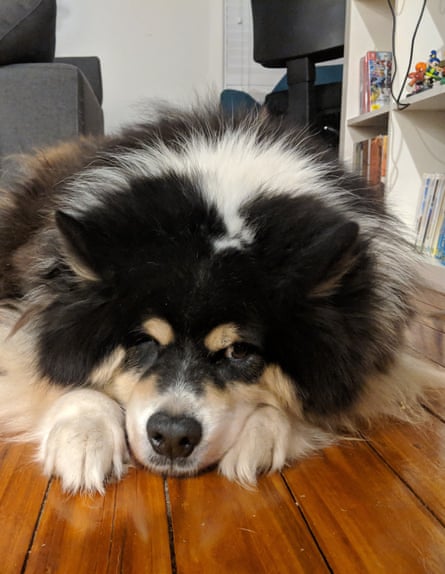When the woman from the pet crematorium asked what to put on the plaque, I had a single thought. Rupert, I told her, who ate a live mouse. The mouse had been inside the house. We had a full army chasing it – me, the kids, a herd of cats – but it had escaped our clutches for a full 30 minutes until, to my horror and delight, I turned just in time to see a scaly tail slip between my dog’s jaws.
I’ve always wondered how long a mouse could live in a dog’s digestive tract. Too long, probably. Rupert lay down for a long time after that.
In the 14 years I lived with my dog, I learned exactly one thing about him: he loved to eat stuff that could kill him. I once planted a pair of camellia trees in pots under my window, only to come back at the end of the day to find them devoured to their roots. An emergency vet visit revealed an entire tray of sausages not even chewed. He ate dark chocolate, including foil. He once ate a packet of crayons and literally shat out a rainbow. His iron stomach was undefeated to the end.
All of this is true. But it’s also all I knew of him. And now that he’s gone, I don’t know how to miss him.
I didn’t have dogs growing up. We were cat people. But movies and books and the general population led me to believe that a dog was a guaranteed soulmate: a shadow who would not leave your side for a moment. A dog would miss you every second of every day. It would relish in your joy and comfort you in sadness. It would protect, honour, cherish and adore you.
Rupert did none of this. He had no interest in people. Never – not once – did he come to me for attention. If I tried to walk him, he refused to leave the house. He flunked out of puppy school, didn’t respond to his name and couldn’t be trusted with smaller, food-sized dogs. If he couldn’t eat it or sleep on it, it simply did not exist.
I tried hard to get to know him. He hated baths. When he knew food was coming, he stamped his front paws like an excited child. He was allergic to cats and would sometimes sneeze so violently he slammed his enormous skull into the floor.
He was incomprehensibly handsome. He was black and soft like a bear, with small, wide-set ears and a white mane. He had one brown eye (glaucoma took the other one). If you parted the black fur on top of his head, it was inexplicably ginger underneath. On the odd occasion he was seen in public, people would cross the street to call him beautiful and he would give them absolutely nothing in return.
At the end of his life, Ru was completely deaf, mostly blind and rapidly deteriorating. But when the vet asked if his behaviour was changing I had to concede that no, it was the same as ever: deep sleep punctuated by eating something revolting.

I don’t think Rupert disliked me. I’m not sure he knew I even lived here. The only time I ever saw him acknowledge another living creature was during my other dog’s cancer treatment, when she was away in surgery. On those days, he would lie by the front door and cry softly, sometimes long into the night. She does the same for him now. Just waiting.
He died in the middle of the night. We all went with him to the small room. It was 3am. He had been barking nonstop for six hours and I knew – finally, something I understood about him – that this was the end.
In the last minutes I lay on the lino floor with my face in his fur and asked him what he remembered. Did he remember sleeping under my feet when we drove home for the first time? Did he remember getting a steak with a candle for his birthdays? Did he remember when he ate a live mouse? And then the barking stopped, and when I sat up he was sleeping with his paws stretched out in front of him, the way he did when he was a baby.
Later in the day, flowers arrived at our house. Heartfelt cards shared in our grief.
“You’ve lost your shadow,” people said, but that wasn’t true. Rupert never reduced himself to being my shadow. He was a dog. To anthropomorphise him was to undermine the simple, canine way he looked at the world. Eat. Sleep. Eat again, but grosser.
“They leave such a big hole,” people said, but he hasn’t. It’s a very small hole, actually: a specific corner of the kitchen, underneath the window, where he slept so aggressively soundly that the tiles eventually cracked right off.
I bought new vases. I lined up the bouquets on the mantelpiece. I struggled to understand how my stinky, slovenly dog fit into this picturesque sadness. Then I noticed all the flowers were dog-safe. No daffodils, azaleas or lilies of the valley. I stood in front of this display of canine sorrow and realised: he was there. The one thing I knew about him.
“Thank you for the flowers,” I told my friends. “Rupert would have loved to eat them.”

 2 months ago
127
2 months ago
127

















































